Introduction
Business in Africa is no longer just about survival. It’s about strategy. And not just any strategy, but one that combines vision, values, and velocity. In a continent that’s rapidly becoming a hotspot for tech startups and innovation, entrepreneurs, tech professionals, and even tech newbies are increasingly asking the right question, not just what a company does, but how it does it, and how well it’s growing while doing so. Evaluating a company’s culture & growth is no longer a nice-to-have skill, it’s essential. Whether you’re a tech enthusiast about to join your first startup, a founder building the next big thing in Tech in Africa, or a professional considering a leap into a new role, understanding a company’s internal vibe and external trajectory is crucial.

Now, some people hear “culture” and think, beanbags and casual Fridays. Others hear “growth” and think only of funding rounds and profit margins. But those are just surface symptoms. The real company’s culture & growth goes deeper: it’s about behavior, mindset, systems, people, values and yes, performance metrics.
So how do you evaluate these invisible-yet-vital factors? Is there a formula? A cheat code? A secret handshake? No. But there is a method. And this blog post will give it to you, step-by-step, with charts, tables, and a side of wisdom that applies whether you’re running a one-person app in Lagos or scaling a fintech in Nairobi. We’ll break down the signs of healthy company culture, dissect the indicators of sustainable growth, and offer practical tools to help you decide whether a company is worth your time, talent, or money. Because whether you’re building or joining a business in Africa’s tech scene, one thing’s clear: A great product may open doors. But a strong culture and real growth? That’s what keeps them open.
Why Culture Matters in Business Growth
The word culture might sound abstract, even fluffy like something only HR departments whisper about during end-of-year retreats. But for anyone involved in tech in Africa, from solo entrepreneurs and startup founders to tech professionals and even wide-eyed tech newbies, company culture is as real and measurable as revenue.
What Is Company Culture, Really?
Company culture is the collective personality of an organization. It’s the way people behave when no one’s watching, the rules people follow (written or unwritten), and the way teams handle success, failure, feedback, and Friday afternoons. If growth is the car, culture is the engine.
And here’s the kicker: even the best business strategy will crash if the culture is toxic, chaotic, or built on sand. On the flip side, a healthy culture can take an average product and turn it into a continent-wide movement.
The Invisible Yet Inescapable Force
Have you ever walked into an office and instantly felt tense, like even the coffee machine was stressed out? That’s culture. Conversely, have you seen lean, fast-moving African tech startups where everyone knows the mission, challenges each other with respect, and actually likes coming to work? Also culture.
In Tech in Africa, where innovation often races ahead of regulation, and funding can make or break a business in one quarter, company culture is what holds everything together (or tears it apart quietly while you’re pitching to investors).
Here’s what culture can influence:
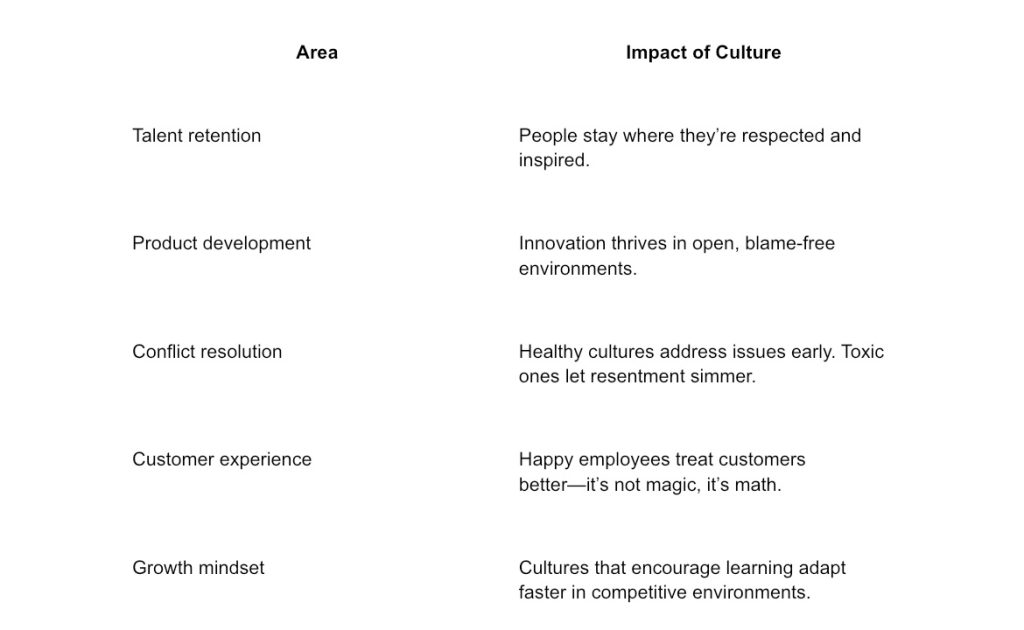
The African Context: More Than Copy-Paste Culture
Here’s a truth not often talked about: culture isn’t imported, it’s built.
Tech startups in Africa can’t just copy Silicon Valley values and expect them to thrive in Nairobi, Accra, or Lagos. A company’s culture must be locally relevant, inclusive, and adaptive to the African context. That means respecting traditions, navigating infrastructure gaps, and building with community in mind, not just code. A startup can be lean and still have values. It can be ambitious and still be kind. It can chase growth while anchoring itself in something deeper.
Red Flag Culture Traits (That Kill Growth Quietly)
- Founder Worship: When one voice drowns out all others.
- “Always-on” Hustle: Burnout in disguise. Productivity isn’t a 24/7 sport.
- Fear of Feedback: No one talks, nothing changes.
- Toxic Positivity: Smiling through problems instead of solving them.
Sound familiar? You’re not alone. Many tech professionals and entrepreneurs across Africa are realizing that a bad culture is harder to fix than a buggy product.
How to Identify a Company’s Culture (Before You Join or Invest)
You’ve seen the pitch deck. The product demo was slick. Their LinkedIn page looks like it’s been curated by a team of angels with Canva Pro. But what’s it really like inside the company?
Evaluating a company’s culture & growth isn’t about glossy marketing. It’s about decoding the reality behind the reputation. Whether you’re an investor, tech professional, startup founder, or even a tech newbie fresh from bootcamp, learning how to read the room (even virtually) can save you from nasty surprises.
Let’s break it down.
1. The Interview Isn’t Just for Them—It’s for You Too
This applies whether you’re applying for a job, pitching a partnership, or considering funding them.
Watch for:
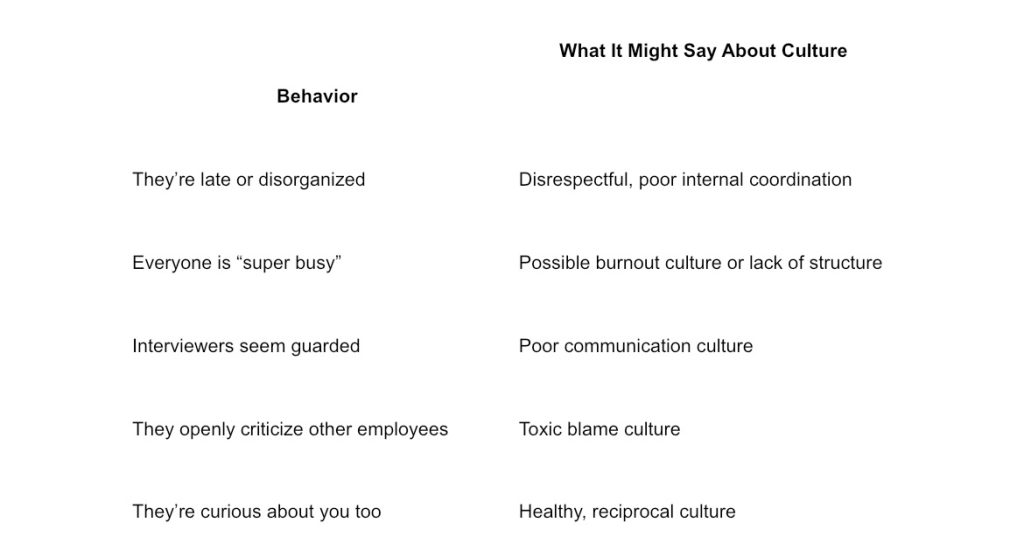
Ask direct questions like:
- “Can you describe how the team handles conflict?”
- “What’s your approach to work-life balance?”
- “What does professional growth look like here?”
The way they answer tells you more than the answer itself.
2. Digital Footprint: What Are They Not Saying Online?
Every tech startup in Africa knows to post about funding rounds and press features. But real culture? That leaks into everything, even tweets.
Check for:
- Team spotlights (Who gets celebrated—and how often?)
- Behind-the-scenes content (Do they seem real or robotic?)
- Language (Is it inclusive? Localized? Fun? Too polished?)
- Silence (If there’s zero mention of employees or internal life, red flag.)
Compare two fictional companies’ Instagram captions:

Which one sounds like they’ll value your mental health? Exactly.
3. Review Sites and Glassdoor Aren’t Just for the West
Even though African companies may not always have loads of reviews online, it’s still worth checking platforms like:
- Glassdoor
- Indeed
- BrighterMonday (for East Africa)
- Local Twitter/X and LinkedIn chatter
Look for patterns in employee feedback, not just the number of stars.
4. Talk to Former Employees
If possible, reach out to someone who used to work there. People who’ve left are more likely to be honest (within reason).
Ask:
- “Why did you leave?”
- “Would you work with them again?”
- “What should I know before getting involved?”
You’d be surprised how often people are willing to share, especially in the tight-knit world of Tech in Africa.
5. Watch Their Meetings (If You Can)
If you get invited to sit in on a company town hall or all-hands meeting, that’s gold. Observe how people interact:
- Is it all top-down?
- Do employees ask questions freely?
- Are women, juniors, or minorities speaking too?
Body language speaks volumes. A smile can be fake but silence is usually real.
Culture Check Checklist
Use this quick checklist before joining or investing in any startup:
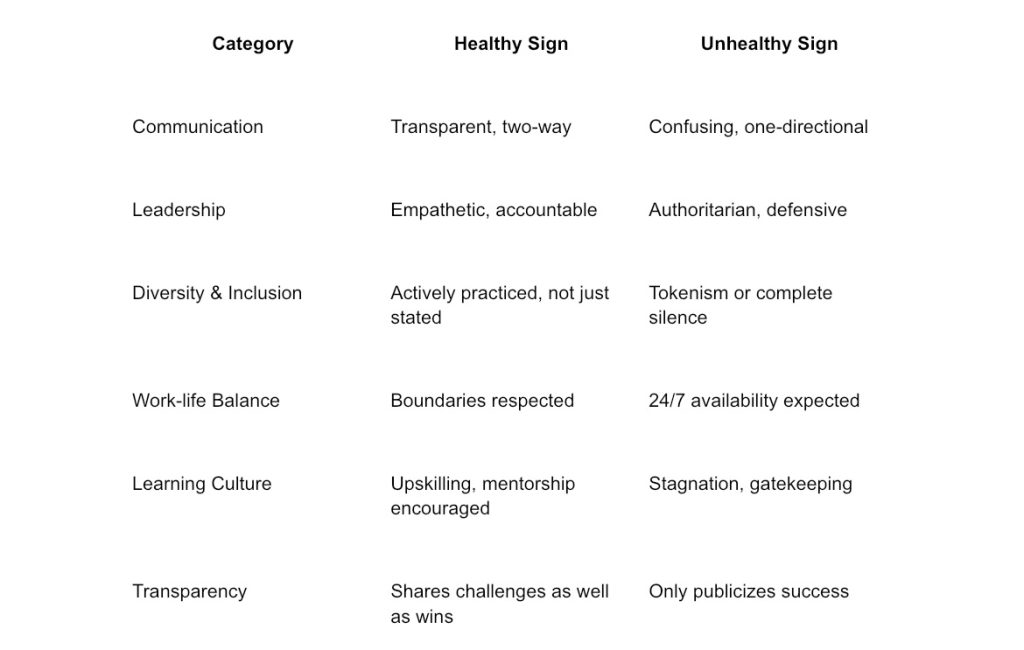
By now, you should be equipped to see a company’s culture before it becomes your 9-5 reality or your next big bet. But there’s more to the story.
How to Measure a Company’s Growth Beyond Revenue
If revenue was the only measure of success, Ponzi schemes would top Forbes lists. While revenue is vital, especially in the lean world of startups and tech in Africa, it’s not the only metric that tells the story of a company’s true trajectory.
In fact, some of the most dangerous businesses are the ones that look like they’re growing until they suddenly aren’t.
So, how do you evaluate a company’s culture & growth properly? You start by understanding that real growth is multidimensional.
The Growth Pillars: A Holistic View
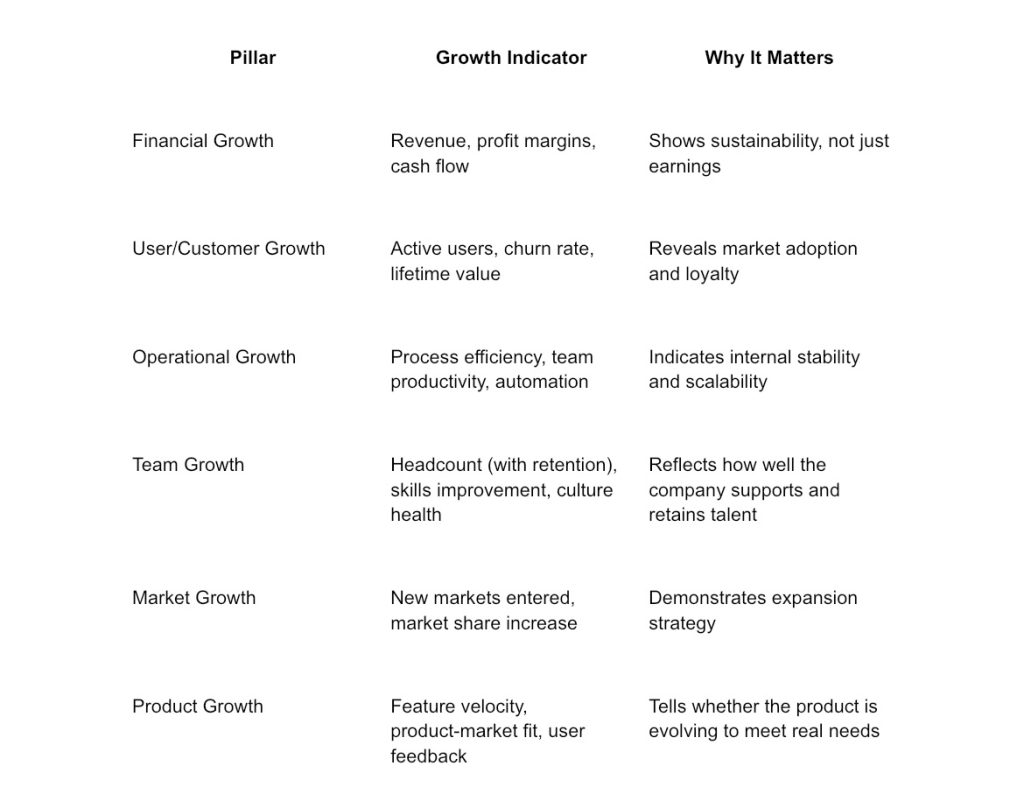
1. Revenue Growth vs. Healthy Financials
It’s easy to get blinded by the number of zeros behind a company’s top line. But ask yourself:
- Is this revenue growing sustainably?
- What’s their customer acquisition cost (CAC)?
- Do they have positive unit economics?
Startups in Africa often face uneven cash flow due to funding cycles or inconsistent payments. If a company is always raising money but never turning a profit or worse, never even trying to, that’s not growth. That’s glamorized debt.
2. Customer Metrics Don’t Lie
The best businesses don’t just acquire users, they keep them.
Key Questions to Ask:
- What’s their churn rate? (High churn = unhappy users.)
- Are customers referring others? (Low marketing, high loyalty.)
- Are they solving real, local problems? (Especially crucial in Tech in Africa.)
If a ride-hailing app is adding features no one asked for while failing to fix late driver issues, they’re not growing. They’re guessing.
3. Operational Efficiency: The Quiet Growth Superpower
Most startups and tech companies celebrate when they get bigger. But real pros celebrate when they get better.
Operational growth looks like:
- Faster deployment cycles
- Reduced bugs in code
- Automated processes
- Clearer internal documentation
- Fewer “I thought you were doing that” moments
Ask insiders:
- How often do things fall through the cracks?
- How long does it take to launch new features?
- Are they always “fighting fires”?
A company can grow without getting messy. If they’re growing and getting cleaner, that’s gold.
4. Team & Talent Growth
You can’t scale culture without people. And you can’t scale people without systems.
Look at:
- How many people they’ve hired in the past year
- How long those people stay
- Whether they promote from within
- If they invest in training and mentorship
Remember: A company that treats its developers like replaceable code monkeys probably builds products that feel just as mechanical.
And in a space filled with rising tech professionals, nurturing talent is a growth strategy, not an HR checkbox.
5. Market Expansion: More Than Just Geography
Sure, a Nigerian startup expanding to Ghana looks great on a press release. But market growth should be strategic, not symbolic.
Smart expansion includes:
- Deep local research
- Partnerships with local players
- Adjusted UX/UI for regional needs
- Regulatory compliance
If they’re simply copying and pasting what worked in one country into another without adapting, that’s not market growth. That’s brand tourism.
6. Product Growth: Features That Actually Matter
The best measure of product growth is usefulness.
Ask:
- Are new features actually being used?
- Are updates based on user feedback?
- Is the product easier to use over time?
In Africa’s competitive tech startup landscape, the startups that win are the ones who evolve their product intelligently, not just frequently.
Growth Audit Table: How to Score a Company’s Real Growth
Use this framework to assess any company you’re analyzing, from funding-rich fintechs to fresh-out-of-hackathon apps.
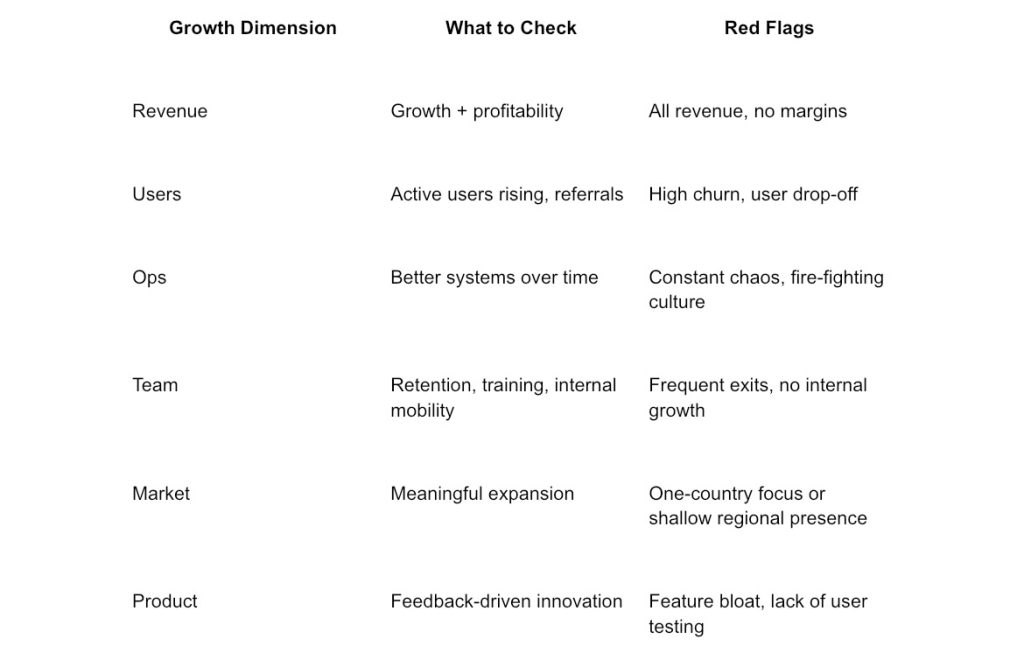
Growth isn’t always loud. Sometimes, it’s found in small improvements, cleaner systems, smarter hires, and loyal customers.
The Culture-Growth Connection: When Values Drive Velocity
If growth is the destination, then culture is the GPS. And as any startup founder or tech professional in Africa knows, using the wrong GPS might take you somewhere but probably not where you want to go.
You’ve seen startups raise millions, hire in a frenzy, expand too fast, then… boom. Gone faster than a 2G signal. And often, the silent assassin isn’t funding or competition. It’s culture misalignment, the disconnect between what a company claims to value and how it actually operates.
Here’s how you connect the dots between culture and growth and why it matters more than ever in tech, especially in Africa’s dynamic startup ecosystem.
Why Culture-First Companies Grow Better
Let’s not romanticize culture. This isn’t about yoga sessions and company retreats on a beach in Zanzibar (though, if you’re offering… I’m in). It’s about embedded behaviors that either drive sustainable growth or quietly sabotage it.
Culture-first companies:
- Make decisions faster
- Communicate clearer
- Adapt better to change
- Build trust with employees and customers
- Retain top talent longer
In Tech in Africa, where startups operate in volatile markets, with unique challenges like power outages, unstable internet, and regulatory uncertainty, a strong culture is the stabilizing force.
The Alignment Matrix: Culture vs. Growth
Use this 2×2 matrix to understand where a company stands:

Let’s break that down:
- Ideal Zone: These companies grow steadily and support their people. They know who they are, and where they’re going. Invest, join, or emulate them.
- Risky Zone: These companies look great from the outside but are burning out inside. Watch for toxic hustle culture or power-hoarding leadership.
- Promising Zone: The team is strong, but the model isn’t working yet. They need better systems, not a new soul.
- Stagnant Zone: If both culture and growth are broken? Unless you’re into stress as a hobby, run.
Real-World Scenarios in Tech in Africa
Let’s look at some anonymized-but-familiar case types:
1. The Funded-but-Fractured Fintech
Raised $5M in pre-seed, grew to 50 employees in six months. Culture? Undefined. Leadership? Silent. Now? 70% turnover and “restructuring.” Classic Risky Zone.
2. The Bootstrapped-but-Balanced SaaS Startup
Grew slowly over two years, kept a tight team, documented internal processes, and now expanding into francophone Africa with zero funding. Lives in the Ideal Zone.
3. The Social Enterprise with a Mission but No Model
Fantastic team spirit, shared purpose, zero profit. Needs a sustainable business model to match its heart. Promising Zone.
4. The Legacy Tech Company That Time Forgot
Ten years old, same staff, same ideas, same tools. “If it ain’t broke” is their motto, but it is broke, and they just haven’t noticed. Deep in the Stagnant Zone.
How to Spot (Mis)Alignment During Evaluation
Here’s a simple table to check alignment between culture and growth claims:
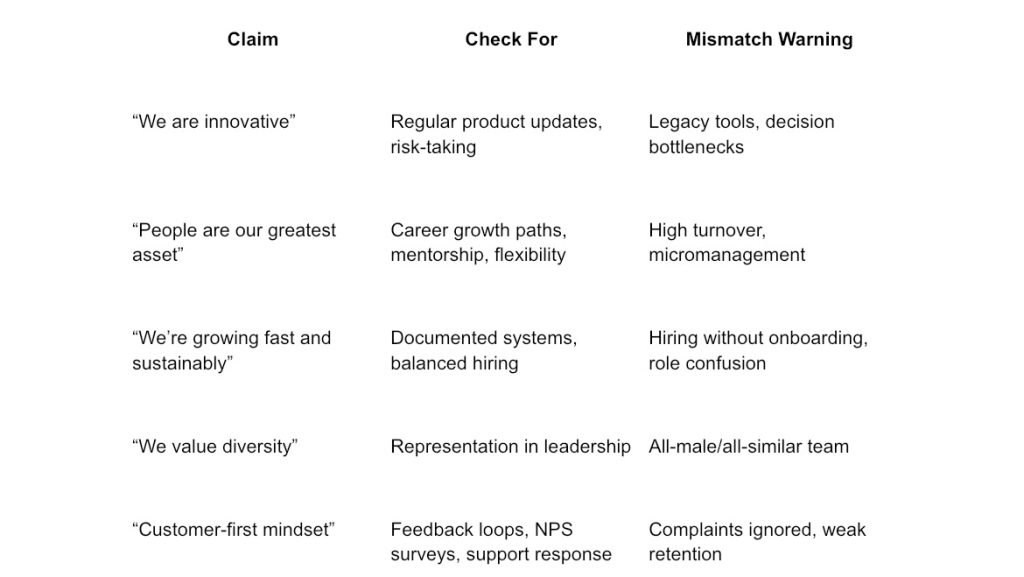
Remember: a company’s culture & growth should move together. If one is sprinting while the other’s crawling, something’s going to snap.
Case Study: Culture-Driven Growth in Africa
Company: ZuriTech (Fictional)
- Sector: HealthTech
- Base: Nairobi
- Approach: Hired slowly, prioritized local hires, created an internal knowledge-sharing platform, offered flexible schedules to caregivers on staff.
Results:
- 0% churn in 12 months
- 40% increase in user adoption from empathetic product features
- Series A raised without layoffs or restructuring
The takeaway? They didn’t just build a product. They built a way to work and their growth followed naturally.
The Full Evaluation Framework (With Tools & Templates)
Now that we’ve dissected every aspect of a company’s culture and growth, it’s time to tie it all together. Because what good is all that knowledge if you can’t apply it?
In this section, we build your evaluation toolkit: a step-by-step framework anyone can use, whether you’re a recruiter in Lagos, an angel investor in Nairobi, a startup founder in Accra, or a tech newbie exploring internship opportunities.
Let’s turn insight into action.
The “4C-G” Framework: Culture + Core + Capacity + Customers = Growth
Here’s the framework simplified:
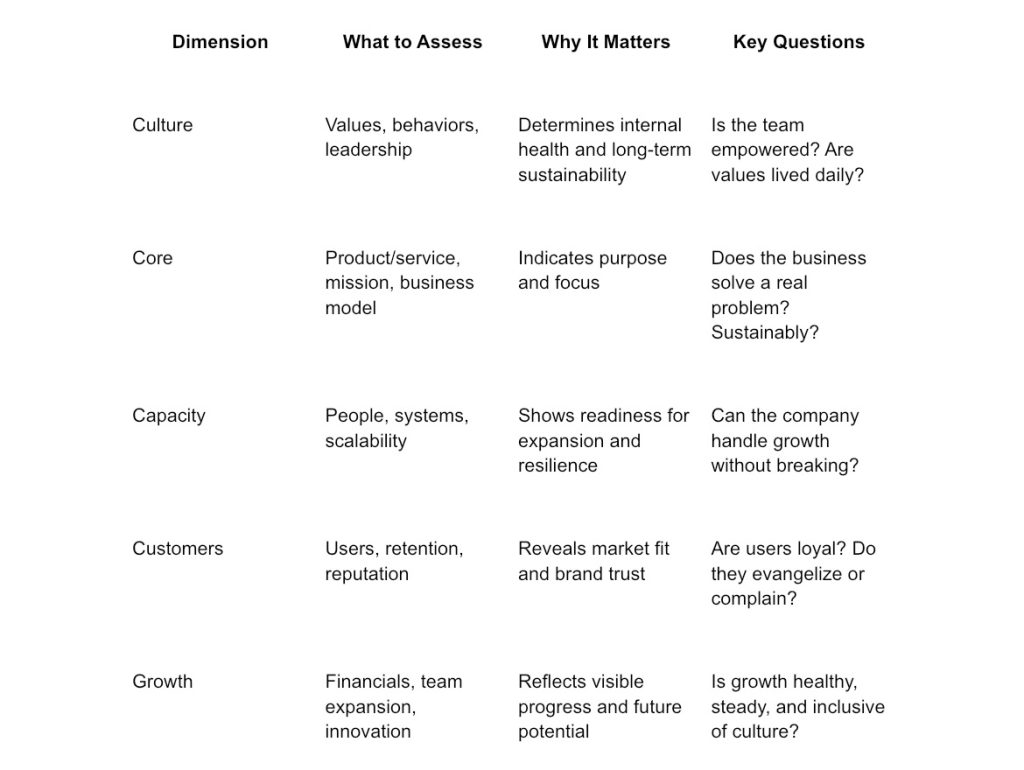
Now let’s explore how to use this practically.
Step-by-Step Guide to Evaluating a Company’s Culture & Growth
Step 1: Pre-Evaluation Research
Before reaching out or applying:
- Study the website: Does it reflect transparency and values?
- Check team pages: Are they diverse? Do employees seem proud to work there?
- Scan social media: Look for signs of real culture (not just office plants and pizza parties).
Tool:
Use this quick research checklist:
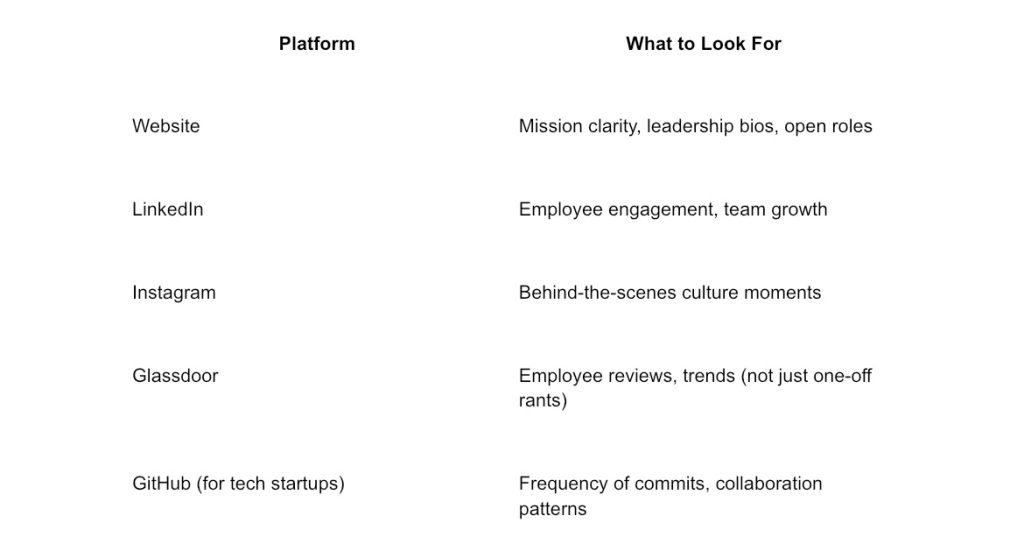
Step 2: Ask the Right Questions
Whether you’re in an interview, investor call, or advisory meeting, ask beyond the pitch.
Culture Questions
- How does your team handle conflict?
- What’s your approach to hybrid or remote work?
- Can you share an example of how feedback improved the company?
Growth Questions
- What’s your churn rate over the last year?
- How do you measure success beyond revenue?
- What’s your roadmap for the next 6–12 months?
Startup Bonus:
If they hesitate or sugarcoat too much, beware. Great companies love transparency.
Step 3: Score the Company Using the Evaluation Matrix
Use this 1–5 scoring table (1 = poor, 5 = excellent):
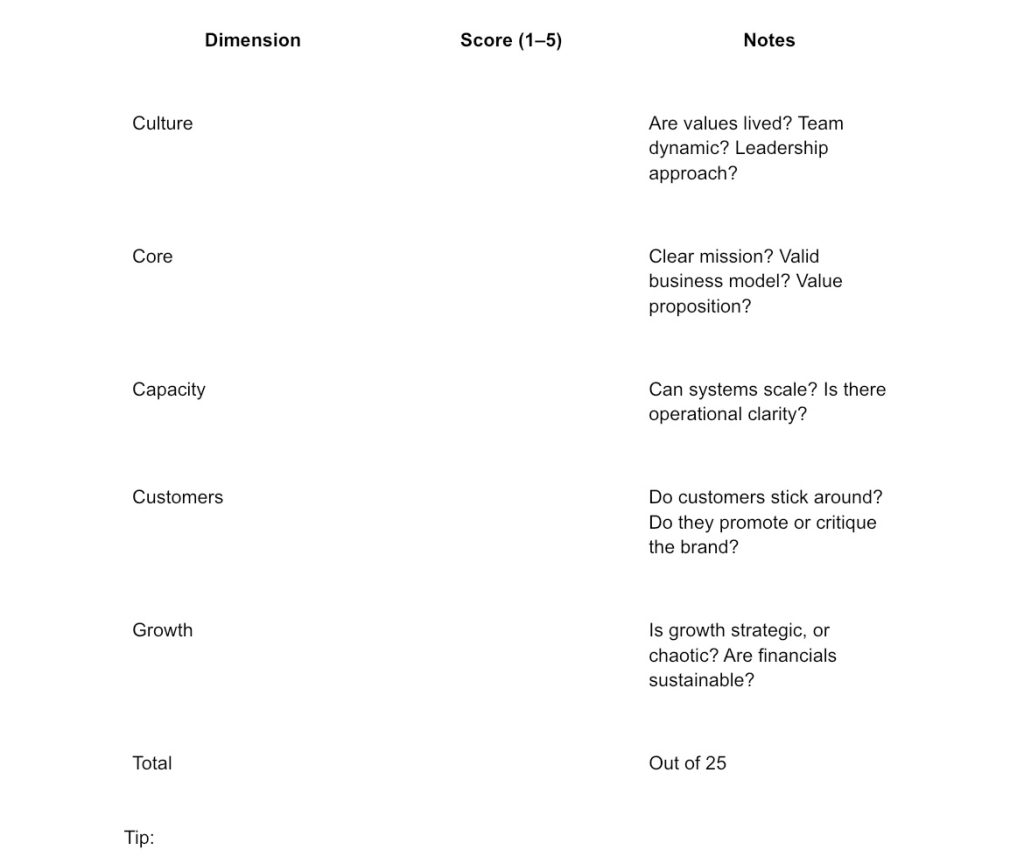
A company scoring under 15 might need serious culture or growth restructuring. 20+ usually signals long-term promise.
Step 4: Align with Your Purpose
This is especially important for tech professionals, founders, and tech newbies entering the ecosystem:
- If you’re a founder: Ask; do your internal values support the growth you’re chasing?
- If you’re a job seeker: Ask; do you align with how the company treats people and problems?
- If you’re an investor or advisor: Ask; does this startup grow with integrity, or just urgency?
Tool:
Use this personal alignment filter:
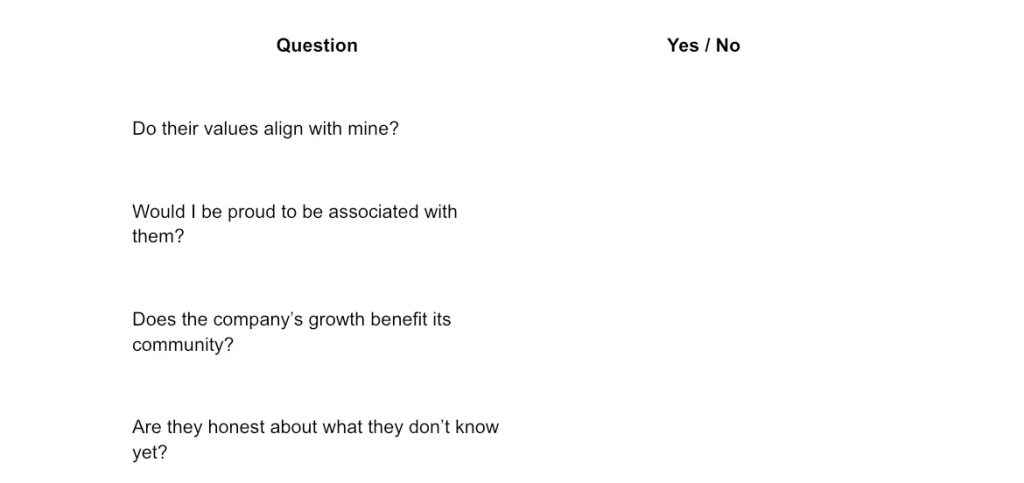
If you’ve got more “No” than “Yes,” that’s your gut and your data talking.
Bonus Tools: For Founders and Teams
For Founders & Entrepreneurs: Culture Retrospective Template
Use this quarterly:
- What values were demonstrated this quarter?
- Where did culture break down?
- What culture wins are we proud of?
- What new behaviors do we want to nurture?
For HR & Ops: Growth Tracking Dashboard
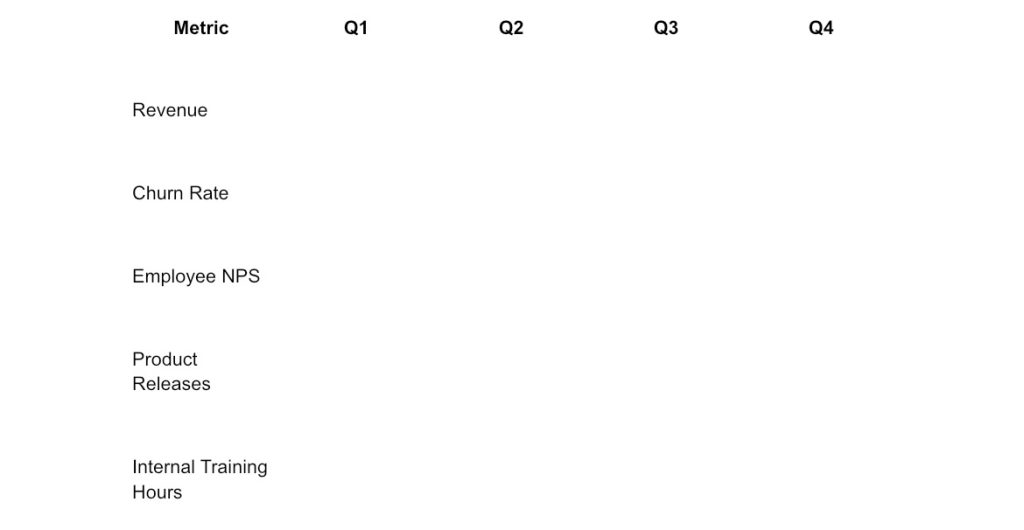
A Reminder for the African Tech Scene
In a continent bursting with innovation and potential, we can’t afford to build fast but shallow. We need growth that’s rooted. Culture that’s intentional. Companies that last longer than a hype cycle. And evaluating a company’s culture & growth isn’t just a due diligence checklist, it’s a moral responsibility for everyone shaping the future of tech in Africa.
Conclusion: Growth That Lasts, Culture That Counts
Evaluating a company’s culture & growth isn’t just a business skill, it’s a survival skill in the fast-paced world of startups, especially within the vibrant, unpredictable terrain of Tech in Africa. As entrepreneurs, tech professionals, founders, and even curious tech newbies, we all want to be part of something meaningful. Not just fast-growing, but forward-thinking. Not just profitable but principled.
Because growth without culture is like a Ferrari with no brakes. It looks good, sounds powerful, but eventually crashes and usually takes a few careers with it. On the flip side, culture without growth is like a great band with no audience. Full of potential, but stuck playing in a garage forever. What we need and what we should all build, support, or invest in, is balance.
Balance between hustle and health.
Between boldness and clarity.
Between metrics and meaning.
And the tools are right here. Whether it’s the 4C-G Framework, the Growth Alignment Matrix, the Culture Checklist, or the Startup Scorecard, you now have everything you need to cut through hype and see the heart of a company. Use them when joining, hiring, investing, partnering or even evaluating your own business.
In the ever-evolving space of tech in Africa, where challenges are as common as ideas, the companies that will thrive aren’t necessarily the loudest or richest, but the ones with deep roots and direction. The ones where culture fuels growth, and growth reinforces culture. So the next time someone pitches you “the next big thing,” smile politely and ask the right questions. You’re not just evaluating potential; you’re protecting the future. Because here, in this ecosystem, we’re not just building businesses. We’re building legacies.